
Coffee beans are not inherently made with animal poop, but there exists a unique and somewhat controversial coffee variety known as "kopi luwak" or "civet coffee" that involves an unconventional process. In the case of kopi luwak, civet cats, small mammals found in some parts of Asia and Africa, play a distinctive role. These cats consume ripe coffee cherries as part of their diet. During the digestive process, enzymes in the civet's stomach affect the proteins and sugars in the coffee beans.
.jpg)
These alterations can potentially lead to a smoother and less bitter flavour profile in the beans. After the beans are excreted by the civet, they are collected from the faeces. They undergo thorough cleaning, fermentation, and roasting before being ground and brewed into coffee. It's worth noting that kopi luwak is often marketed as a premium and exotic coffee variety due to its unique production process and perceived flavour characteristics.
Many civet cats used in this process are kept in captivity in conditions that do not meet animal welfare standards. Furthermore, the high demand for kopi luwak has led to the exploitation and mistreatment of these animals in some cases.
As a result, consumers are encouraged to exercise caution and consider the ethical and sustainability issues associated with kopi luwak. Many coffee enthusiasts prefer to opt for coffee produced through more traditional and humane methods, where beans are harvested directly from coffee plants. In general, the vast majority of coffee consumed worldwide is not made with animal poop but is produced through conventional processes that do not involve animal digestion.




 click and follow Indiaherald WhatsApp channel
click and follow Indiaherald WhatsApp channel